外研版八年级上册Module 12 Unit 1 What should we do before help arrives 课件(共31张PPT)
文档属性
| 名称 | 外研版八年级上册Module 12 Unit 1 What should we do before help arrives 课件(共31张PPT) |
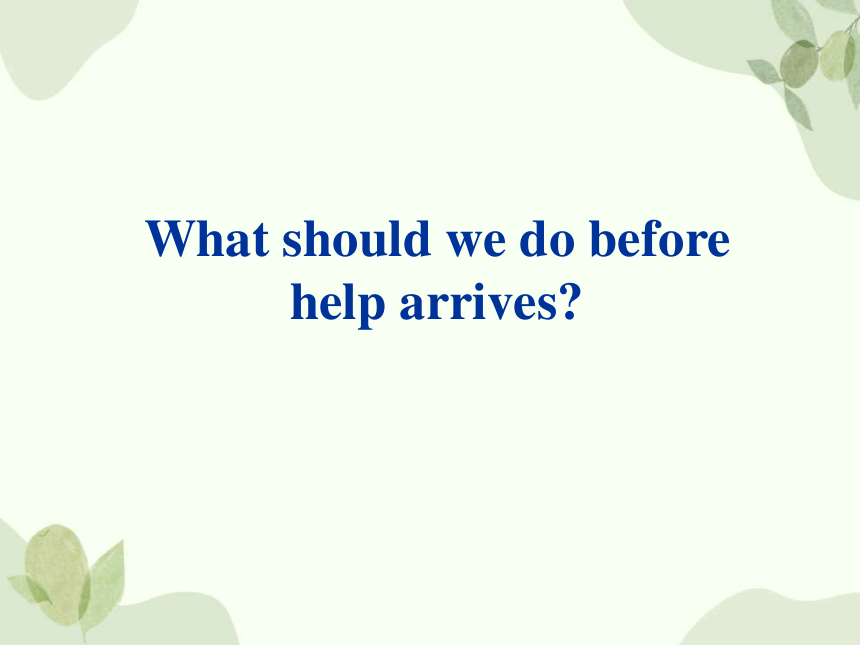
|
|
| 格式 | ppt | ||
| 文件大小 | 1.3MB | ||
| 资源类型 | 教案 | ||
| 版本资源 | 外研版 | ||
| 科目 | 英语 | ||
| 更新时间 | 2024-10-18 08:29:27 | ||
图片预览


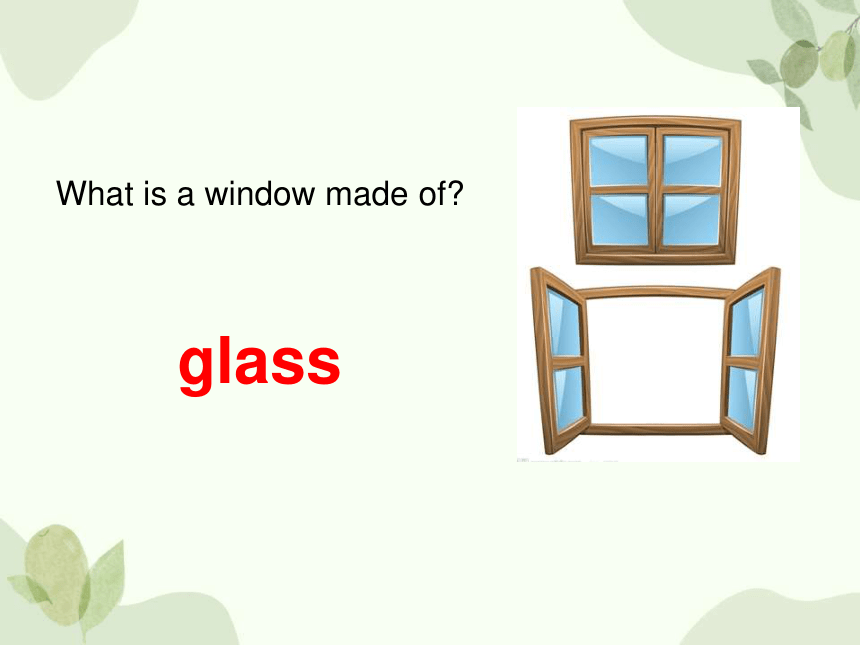
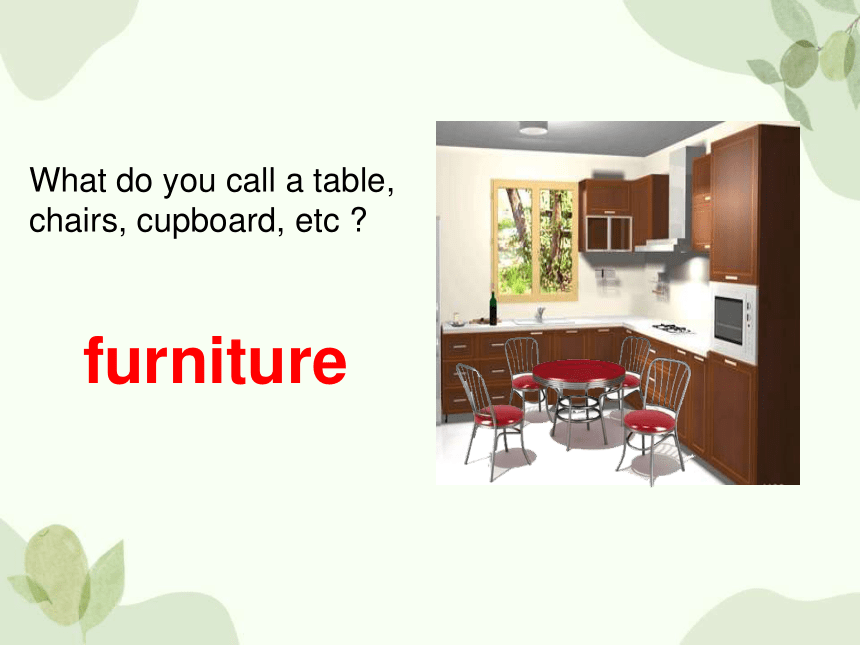
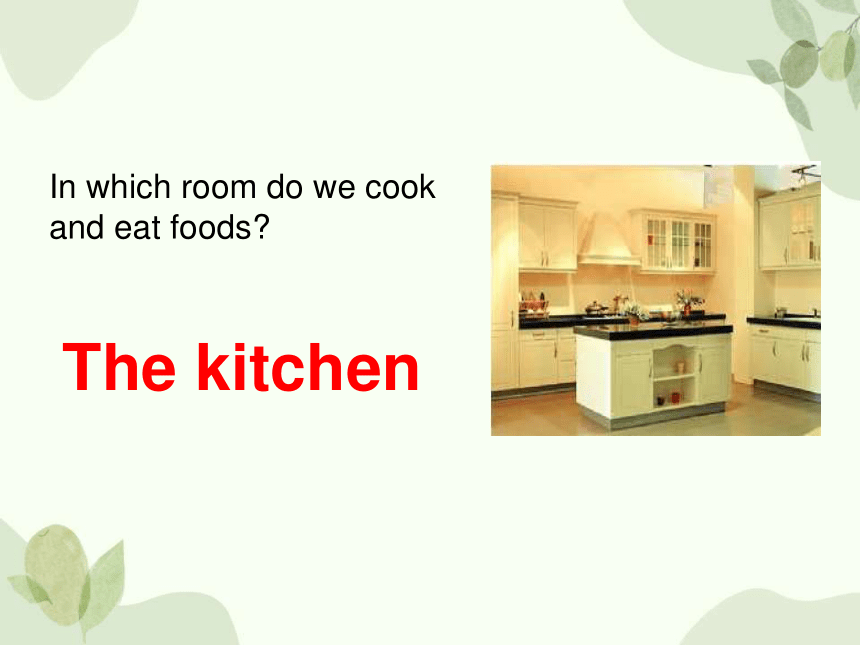
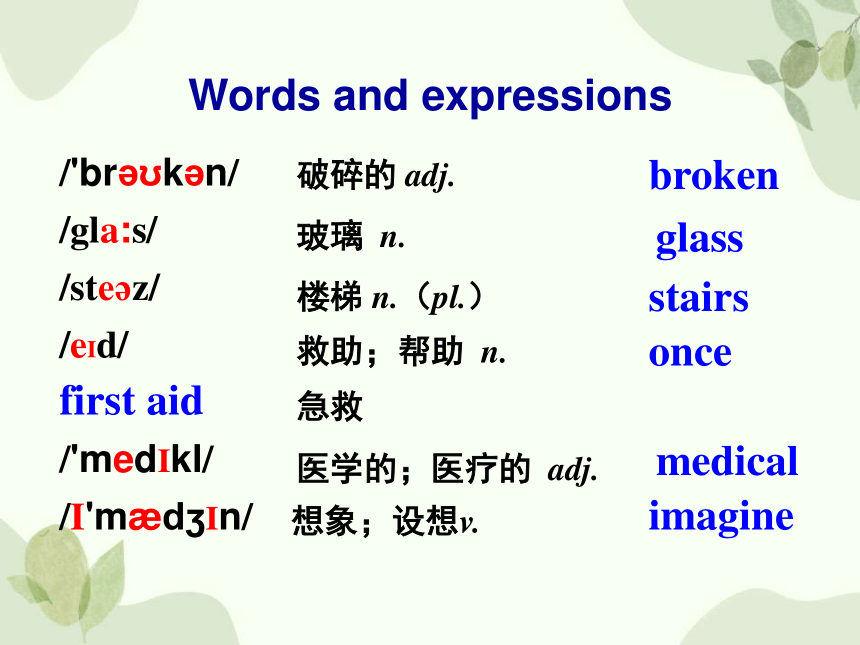
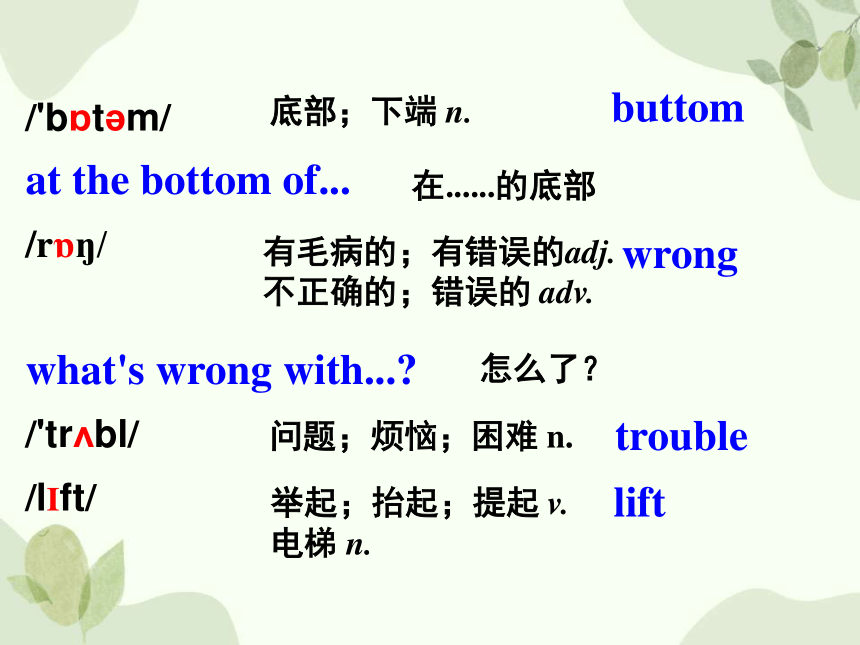
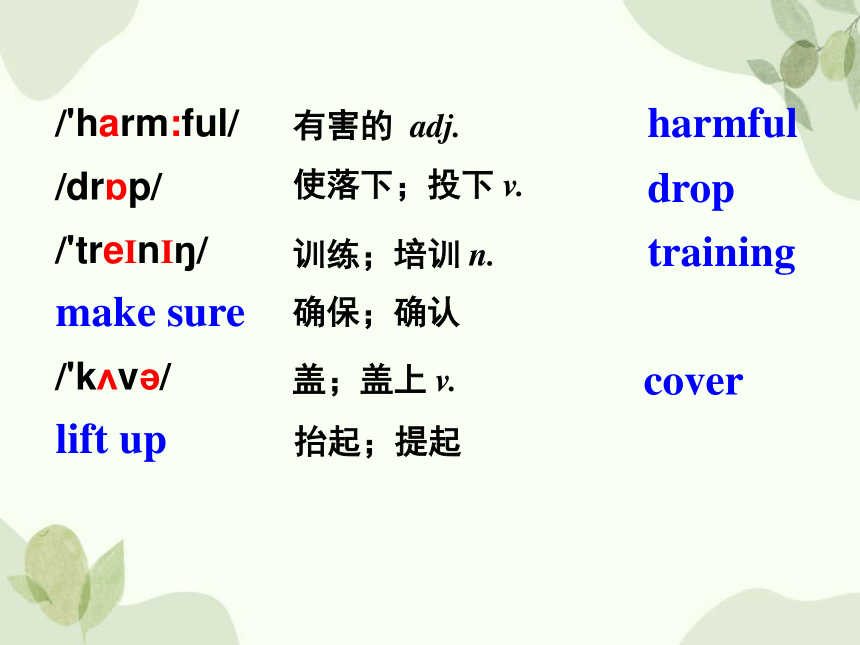
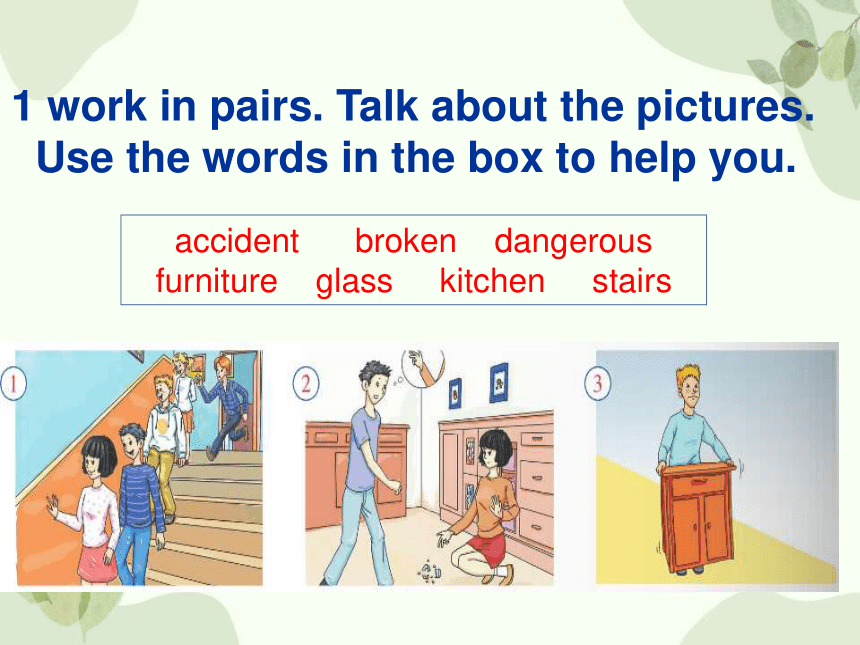
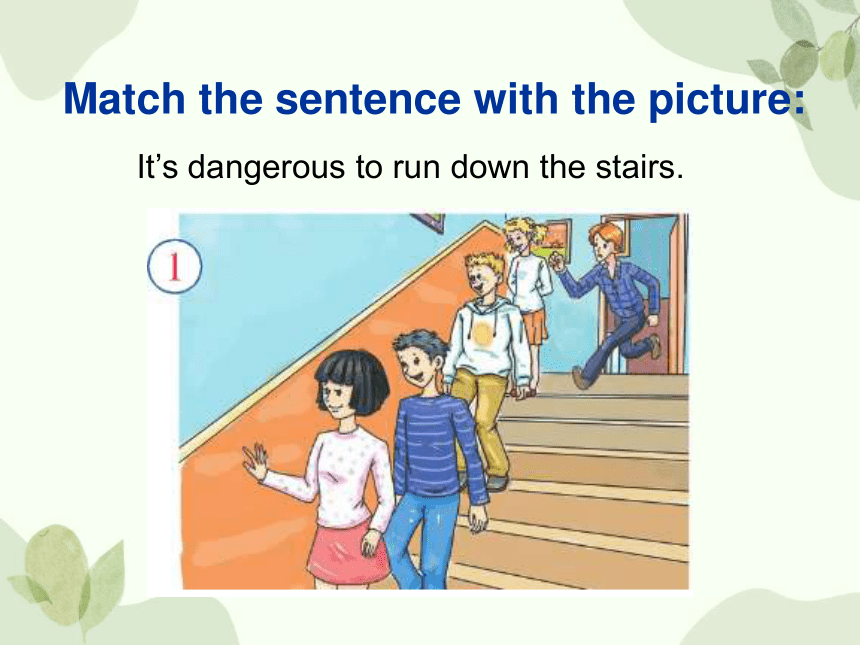
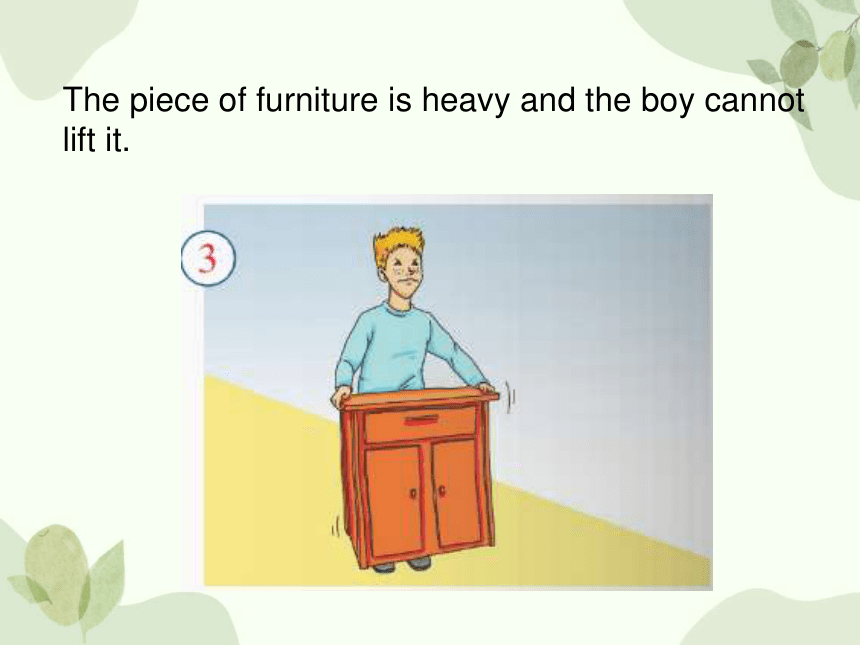
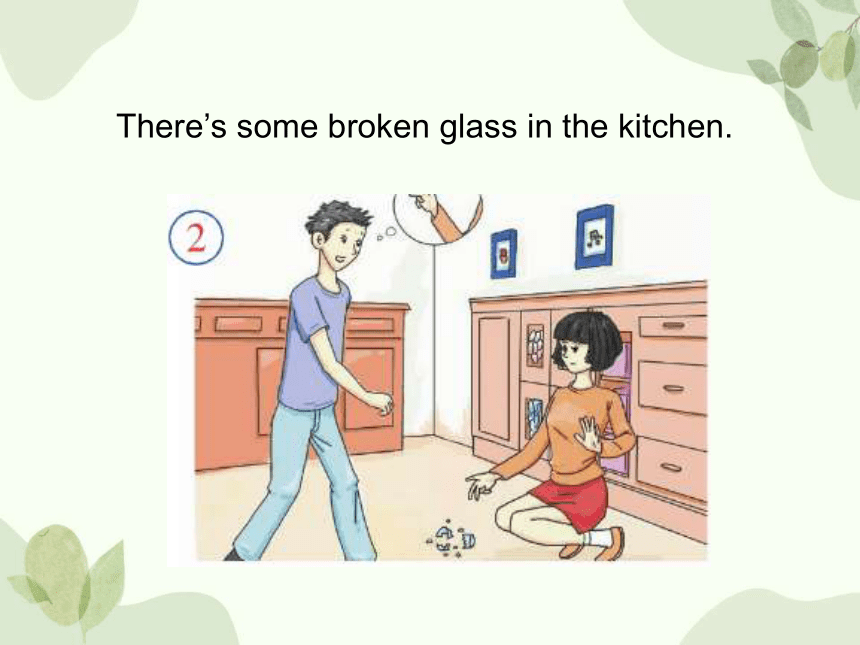
文档简介
(共31张PPT)
What should we do before help arrives
Answer the question
When something is broken, can you use it again
No
What is a window made of
glass
What do you call a table, chairs, cupboard, etc
furniture
In which room do we cook and eat foods
The kitchen
/'br k n/
/gla:s/
/ste z/
/eId/
first aid
/'medIkl/
/I'm d In/
破碎的 adj.
broken
玻璃 n.
glass
楼梯 n.(pl.)
once
救助;帮助 n.
急救
stairs
Words and expressions
imagine
想象;设想v.
medical
医学的;医疗的 adj.
/'b t m/
at the bottom of...
/r /
what's wrong with...
/'tr bl/
/lIft/
底部;下端 n.
buttom
在......的底部
有毛病的;有错误的adj.
不正确的;错误的 adv.
wrong
怎么了?
问题;烦恼;困难 n.
举起;抬起;提起 v.
电梯 n.
lift
trouble
/'harm:ful/
/dr p/
/'treInI /
make sure
/'k v /
lift up
有害的 adj.
harmful
使落下;投下 v.
training
训练;培训 n.
cover
确保;确认
drop
盖;盖上 v.
抬起;提起
1 work in pairs. Talk about the pictures.
Use the words in the box to help you.
accident broken dangerous
furniture glass kitchen stairs
Match the sentence with the picture:
It’s dangerous to run down the stairs.
The piece of furniture is heavy and the boy cannot lift it.
There’s some broken glass in the kitchen.
2 Listen and check what the pictures
are about
Accident often happen before you notice them. You could fall when you go down the stairs at school. It’s quite dangerous in the kitchen
At home because broken glass or knives can cut you. And moving heavy furniture is dangerous too. You could drop it and hurt your foot.
Then work in pairs and describe the picture with more sentences.
Everyday English
What can we do to…
How we do that How can we do that
Ms James: This morning’s class is about first aid, or
giving someone basic medical help. Let’s imagine an
accident. A boy is lying at the bottom of the stairs.
He isn’t moving or making a sound. He is in pain.
What can we do to help him
Betty: First of all, find out what’s wrong with him.
Ms James: How do we do that
Betty: Ask him.
Ms James: Ok. But he could have trouble hearing
you or speaking to you.
Lingling: Shout for help Call 120
Listen and read.
at the bottom of…
在…的底端,底部
find out
查明;发现;找到
Ms James: Good idea, but what should we do before
help arrives
Tony: Make him comfortable.
Ms James: And how can we do that?
Tony: Lift him up and sit him on a chair
Ms James: No, that could be harmful! You could
drop him and hurt him even more. Betty, you must
know! You did some basic medical training.
Betty: Make sure he’s warm. Cover him with a coat.
Ms James: That’s such good advice that you could
be a doctor, Betty!
Now read these first aid suggestions
and decide if they are good ideas (√)
or bad ideas (×).
1 Ask the boy what is wrong.
2 Get help.
3 Shout so the boy can hear you.
4 Move the boy to a more comfortable place.
5 Make sure the boy is warm.
×
√
√
×
√
4 Complete the passage
bottom Cover drop harmful imagine lift
medical pain
Let’s (1) _______ you see a boy lying at the(2)________ of the stairs. What should you do Call for (3) ________ help immediately. Do not (4)_____ the boy up and sit him on a chair. This could be (5) ________ for him! Even worse, you might (6)______ him while you are moving him! That would cause a lot of (7)_____. (8)______ him with a coat and make sure he is warm. Then wait for the doctors to arrive.
imagine
bottom
medical
lift
harmful
drop
pain
Cover
1. He is in pain.他很疼。
in pain的意思是“处在疼痛之中”。如:
Are you still in pain
你还疼吗?
2. But he could have trouble hearing you or speaking to you. 但是他有可能无法听到你或者和你说话。
句中的could表示推测。如:
You could be right.
你可能是对的。
Language points
have trouble doing sth./have trouble with sth
的意思是“做…有困难”。
如:
We never have any trouble getting the car started.
发动这辆车子我们从没费过劲儿。
We’re having a lot of trouble with a new computer system.
新的电脑系统让我们焦头烂额。
3. Make sure he’s warm.
确保他不受凉。
make sure的意思是“确保,保证”。如:
Make sure you turn off all the lights before you go out.
在出门之前一定要把所有的灯都关掉。
I think I locked the door, but I’ll go hack and check,
just to make sure.
我觉得我锁上门了,但我还是要回去看看,确认一下。
4. That’s such good advice that you could be a doctor, 这个建议非常好,你都可以当医生了!
such... that...这个句型表达“如此……以至于……”的意思,such后面接名词,名词前可以有形容词修饰。如果只有形容词或副词,则要使用so...that...这一句型。如:
It is such a tiny kitchen that only one person can cook in it.
这个厨房很小,只能容下 一个人在里面做饭。
They are such nice people that we all like them.
他们人很好,我们都喜欢他们。
He urn so weak that he could hardly stand up.
他很虚弱,几乎站不起来。
Everything happened so quickly that I hadn’t time to think.
一切发生得太快 了,我都 没有时间思考。
5. Work in pairs. Ask and answer questions.
Student A: You are a teacher of basic medical training.
Student B: You are a student of basic medical traning.
—What do you do if someone’s hurt
— Ask him/her what happened…
我们学习过情态动词can和could表示“能够”,表示对现在或将来的推测,意为“会,可能”,往往用于否定句和疑问句。用于疑问句时,can比could表示的“可能性”要大;用于否定句时,cannot (can’t) 表示“不可能”。如:
You can’t be serious!
你不是认真的吧!
could则可用于肯定句、否定句和疑问句。在以下例句中,can和could均表示可能:
He could be in pain. 他可能很疼。
That could be harmful! 那可能有害!
Can/Could this be true 这有可能是真的吗?
情态动词must, can, could表示推测
情态动词must也可以表示猜测,意思为“一定,准是”,通常只用于肯定句。如课文中的 例子:
Betty, you must know!贝蒂,你肯定知道!
请仔细对比下列一组句子:
Who sent the present Can it be your brother
是谁送来的礼物啊? 会是你哥哥吗? (询问 可能性)
It must be your brother. I saw him in your room just now.
肯定是你哥哥,我刚才看见他在 你的房间里。
(语气强烈,表示非常肯定)
It can't be my brother. He is still in France.
不可能是我哥哥,他还在法国呢。(表示不可能)
1. Jenny ______ with him at that time, for I was having dinner with her in my home. A. can’t have been B. mustn’t have been C. must have been D. may have been 2. It is cold in the room. They ______ have turned off
the heating. A. must B. ought to C. should D. could 3. — Someone is knocking at the door. — Who ______ it be at this hour of day A. may B. can C. must D. should 4. I didn’t hear the phone. I ______ asleep. A. must be B. must have been C. should be D. should have been
A
A
B
B
单项选择
5. Johnson ______ be a policeman. He is much too short. A. may B. mustn’t C. should D. can’t 6. — Jack fell off a ladder yesterday, but he was all right. — He is lucky. He ______ himself badly. A. can have hurt B. could have wounded
C. might have hurt D. must have wounded 7. — Who told you the news — I don’t remember clearly. It ______ Mary. — It ______ Mary. She doesn’t know it. A. may have been; can’t be B. can be; mustn’t be C. must have been; can’t have been D. may have been; may not be
D
C
A
Fill in the blanks with the correct words or expressions in brackets.
It’s very dangerous. You _______(must/mustn’t) keep away from it!
They _______(could/mustn’t) still win – the game isn’t over yet.
_____________(Move/Don’t move) the boy if he’s broken his arm.
________(Keep/Don’t keep) the boy warm. He’s freezing
must
could
Don’t move
Keep
Homework
Read activity 3 again and again.
Preview Unit 2.
What should we do before help arrives
Answer the question
When something is broken, can you use it again
No
What is a window made of
glass
What do you call a table, chairs, cupboard, etc
furniture
In which room do we cook and eat foods
The kitchen
/'br k n/
/gla:s/
/ste z/
/eId/
first aid
/'medIkl/
/I'm d In/
破碎的 adj.
broken
玻璃 n.
glass
楼梯 n.(pl.)
once
救助;帮助 n.
急救
stairs
Words and expressions
imagine
想象;设想v.
medical
医学的;医疗的 adj.
/'b t m/
at the bottom of...
/r /
what's wrong with...
/'tr bl/
/lIft/
底部;下端 n.
buttom
在......的底部
有毛病的;有错误的adj.
不正确的;错误的 adv.
wrong
怎么了?
问题;烦恼;困难 n.
举起;抬起;提起 v.
电梯 n.
lift
trouble
/'harm:ful/
/dr p/
/'treInI /
make sure
/'k v /
lift up
有害的 adj.
harmful
使落下;投下 v.
training
训练;培训 n.
cover
确保;确认
drop
盖;盖上 v.
抬起;提起
1 work in pairs. Talk about the pictures.
Use the words in the box to help you.
accident broken dangerous
furniture glass kitchen stairs
Match the sentence with the picture:
It’s dangerous to run down the stairs.
The piece of furniture is heavy and the boy cannot lift it.
There’s some broken glass in the kitchen.
2 Listen and check what the pictures
are about
Accident often happen before you notice them. You could fall when you go down the stairs at school. It’s quite dangerous in the kitchen
At home because broken glass or knives can cut you. And moving heavy furniture is dangerous too. You could drop it and hurt your foot.
Then work in pairs and describe the picture with more sentences.
Everyday English
What can we do to…
How we do that How can we do that
Ms James: This morning’s class is about first aid, or
giving someone basic medical help. Let’s imagine an
accident. A boy is lying at the bottom of the stairs.
He isn’t moving or making a sound. He is in pain.
What can we do to help him
Betty: First of all, find out what’s wrong with him.
Ms James: How do we do that
Betty: Ask him.
Ms James: Ok. But he could have trouble hearing
you or speaking to you.
Lingling: Shout for help Call 120
Listen and read.
at the bottom of…
在…的底端,底部
find out
查明;发现;找到
Ms James: Good idea, but what should we do before
help arrives
Tony: Make him comfortable.
Ms James: And how can we do that?
Tony: Lift him up and sit him on a chair
Ms James: No, that could be harmful! You could
drop him and hurt him even more. Betty, you must
know! You did some basic medical training.
Betty: Make sure he’s warm. Cover him with a coat.
Ms James: That’s such good advice that you could
be a doctor, Betty!
Now read these first aid suggestions
and decide if they are good ideas (√)
or bad ideas (×).
1 Ask the boy what is wrong.
2 Get help.
3 Shout so the boy can hear you.
4 Move the boy to a more comfortable place.
5 Make sure the boy is warm.
×
√
√
×
√
4 Complete the passage
bottom Cover drop harmful imagine lift
medical pain
Let’s (1) _______ you see a boy lying at the(2)________ of the stairs. What should you do Call for (3) ________ help immediately. Do not (4)_____ the boy up and sit him on a chair. This could be (5) ________ for him! Even worse, you might (6)______ him while you are moving him! That would cause a lot of (7)_____. (8)______ him with a coat and make sure he is warm. Then wait for the doctors to arrive.
imagine
bottom
medical
lift
harmful
drop
pain
Cover
1. He is in pain.他很疼。
in pain的意思是“处在疼痛之中”。如:
Are you still in pain
你还疼吗?
2. But he could have trouble hearing you or speaking to you. 但是他有可能无法听到你或者和你说话。
句中的could表示推测。如:
You could be right.
你可能是对的。
Language points
have trouble doing sth./have trouble with sth
的意思是“做…有困难”。
如:
We never have any trouble getting the car started.
发动这辆车子我们从没费过劲儿。
We’re having a lot of trouble with a new computer system.
新的电脑系统让我们焦头烂额。
3. Make sure he’s warm.
确保他不受凉。
make sure的意思是“确保,保证”。如:
Make sure you turn off all the lights before you go out.
在出门之前一定要把所有的灯都关掉。
I think I locked the door, but I’ll go hack and check,
just to make sure.
我觉得我锁上门了,但我还是要回去看看,确认一下。
4. That’s such good advice that you could be a doctor, 这个建议非常好,你都可以当医生了!
such... that...这个句型表达“如此……以至于……”的意思,such后面接名词,名词前可以有形容词修饰。如果只有形容词或副词,则要使用so...that...这一句型。如:
It is such a tiny kitchen that only one person can cook in it.
这个厨房很小,只能容下 一个人在里面做饭。
They are such nice people that we all like them.
他们人很好,我们都喜欢他们。
He urn so weak that he could hardly stand up.
他很虚弱,几乎站不起来。
Everything happened so quickly that I hadn’t time to think.
一切发生得太快 了,我都 没有时间思考。
5. Work in pairs. Ask and answer questions.
Student A: You are a teacher of basic medical training.
Student B: You are a student of basic medical traning.
—What do you do if someone’s hurt
— Ask him/her what happened…
我们学习过情态动词can和could表示“能够”,表示对现在或将来的推测,意为“会,可能”,往往用于否定句和疑问句。用于疑问句时,can比could表示的“可能性”要大;用于否定句时,cannot (can’t) 表示“不可能”。如:
You can’t be serious!
你不是认真的吧!
could则可用于肯定句、否定句和疑问句。在以下例句中,can和could均表示可能:
He could be in pain. 他可能很疼。
That could be harmful! 那可能有害!
Can/Could this be true 这有可能是真的吗?
情态动词must, can, could表示推测
情态动词must也可以表示猜测,意思为“一定,准是”,通常只用于肯定句。如课文中的 例子:
Betty, you must know!贝蒂,你肯定知道!
请仔细对比下列一组句子:
Who sent the present Can it be your brother
是谁送来的礼物啊? 会是你哥哥吗? (询问 可能性)
It must be your brother. I saw him in your room just now.
肯定是你哥哥,我刚才看见他在 你的房间里。
(语气强烈,表示非常肯定)
It can't be my brother. He is still in France.
不可能是我哥哥,他还在法国呢。(表示不可能)
1. Jenny ______ with him at that time, for I was having dinner with her in my home. A. can’t have been B. mustn’t have been C. must have been D. may have been 2. It is cold in the room. They ______ have turned off
the heating. A. must B. ought to C. should D. could 3. — Someone is knocking at the door. — Who ______ it be at this hour of day A. may B. can C. must D. should 4. I didn’t hear the phone. I ______ asleep. A. must be B. must have been C. should be D. should have been
A
A
B
B
单项选择
5. Johnson ______ be a policeman. He is much too short. A. may B. mustn’t C. should D. can’t 6. — Jack fell off a ladder yesterday, but he was all right. — He is lucky. He ______ himself badly. A. can have hurt B. could have wounded
C. might have hurt D. must have wounded 7. — Who told you the news — I don’t remember clearly. It ______ Mary. — It ______ Mary. She doesn’t know it. A. may have been; can’t be B. can be; mustn’t be C. must have been; can’t have been D. may have been; may not be
D
C
A
Fill in the blanks with the correct words or expressions in brackets.
It’s very dangerous. You _______(must/mustn’t) keep away from it!
They _______(could/mustn’t) still win – the game isn’t over yet.
_____________(Move/Don’t move) the boy if he’s broken his arm.
________(Keep/Don’t keep) the boy warm. He’s freezing
must
could
Don’t move
Keep
Homework
Read activity 3 again and again.
Preview Unit 2.
同课章节目录
- Module 1 How to learn English
- Unit 1 Let's try to speak English as much as possi
- Unit 2 You should smile at her.
- Unit 3 Language in use .
- Module 2 My home town and my country
- Unit 1 It's taller than many other buildings.
- Unit 2 Cambridge is a beautiful city in the east o
- Unit 3 Language in use .
- Module 3 Sports.
- Unit 1 Nothing is more exciting than playing tenni
- Unit 2 This year we training more carefully.
- Unit 3 Language in use .
- Module 4 Planes, ships and trains .
- Unit 1 He lives the farthest from school.
- Unit 2 What is the best way to travel.
- Unit 3 Language in use .
- Module 5 Lao She Teahouse.
- Unit 1 I wanted to see the Beijing Opera.
- Unit 2 It descibes the changes in Chinese society.
- Unit 3 Language in use .
- Module 6 Animals in danger.
- Unit 1 It allows people to get closer to them .
- Unit 2 The WWF is working hard to save them all.
- Unit 3 Language in use .
- Revision module A
- Module 7 A famous story
- Unit 1 Alice was sitting with her sister by the ri
- Unit 2 She was thinking about her cat.
- Unit 3 Language in use .
- Module 8 Accidents
- Unit 1 While the car were changing to red, a car s
- Unit 2 I was trying to pick it up when it bite me
- Unit 3 Language in use .
- Module 9 Population
- Unit 1 The population of China is about 1.37 billi
- Unit 2 Arnwick was a city with 200,000 people.
- Unit 3 Language in use .
- Module 10 The weathe
- Unit 1 It might snow.
- Unit 2 The weather is fine all year round.
- Unit 3 Language in use .
- Module 11 Way of life
- Unit 1 In China ,we open a gift later.
- Unit 2 In England, you usually drink tea with milk
- Unit 3 Language in use .
- Module 12 Help
- Unit 1 What should we do before help arrives?
- Unit 2 Stay away from windows and heavy furniture.
- Unit 3 Language in use .
- Revision module B
